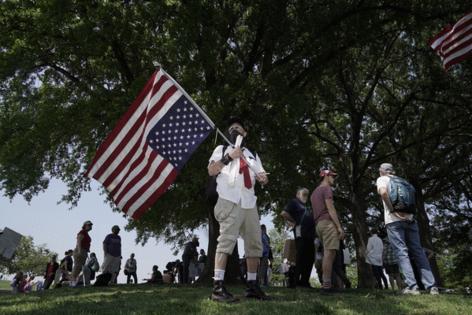Commentary: The next 100 days: America's latest test of democracy
Published in Op Eds
For decades, we have watched America wrestle with its demons. Sometimes, she has successfully pinned them down. Other times, the demons have slipped beyond her grasp. Yet, America has always remained in the ring. There is no difference right now, and the stakes couldn't be higher.
Across America, from small-town council meetings to state legislatures, there's a coordinated effort to roll back the clock on civil rights, geopolitical relations and the global economy. It's not subtle, and it's not accidental. The targeting of immigrants and citizens of color has become so normalized that we risk becoming numb to it. For example, what happened in Springfield, Ohio, late last year? When national politicians started pushing rhetoric against Haitian immigrants, it wasn't just local politics at play. It was a test balloon, a preview of talking points soon echoed in halls of government and media outlets nationwide. Thus, this is how discrimination, intolerance and blatant hate go mainstream or viral—it starts small, tests the waters, and spreads like a virus through our body politic and social system.
Sadly, I have studied and endured American politics long enough to recognize patterns, and this one's familiar. Every major stride toward equality in American history has faced pushback. After Reconstruction came Jim Crow. After the civil rights movement came the "law and order" era. After Obama's presidency ... we all know what came next. However, the difference at this moment is that we are not fighting these battles with the weaponry of our parents and grandparents. Once again, the tools of discrimination have gone digital but so have the tools of resistance.
The next 100 days will set the trajectory for this fight, not because they'll end it, but because they'll determine how we fight it. We're at one of those inflection points where silence becomes complicity and inaction becomes endorsement.
Consider all that has happened with voting rights, DEI, immigration, First Amendment action, and the dismantling of government infrastructure. We continue to see a tsunami of executive actions, legislation, and litigation that, while carefully worded to appear neutral, disproportionately affect minority communities. These aren't your grandfather's literacy tests—these are sophisticated administrative hurdles dressed up in the language of election and homeland security, patriotism, balanced budgets, and the meritus playing field. The intent hasn't changed; only the packaging has.
The attacks on diversity aren't just targeting the ballot box. They're showing up in school board meetings where discussions of American history are being sanitized, in housing policies that maintain segregation through bureaucratic sleight-of-hand, and in immigration policies that seem designed to preserve a demographic status quo that's already long gone.
Still, hope abounds! We are witnessing and encouraging greater and more strategic resistance than ever before. This generation of activists isn't marching—they're running for office. Civil rights organizations aren't just filing lawsuits but building databases to track discrimination patterns. Community groups aren't just protesting—they're creating alternative institutions.
The old divide-and-conquer playbooks are still employed, but new obstacles are yet to arise. When politicians try to pit ethnic communities against immigrant communities or working-class whites against urban Black and brown people, they find that these groups are often already connected through informal yet intricately composed networks of social media, shared economic interests and cross-cultural organizations.
Social and civilly conscious engaged actors must remain clear about what we are against. The forces pushing discrimination have deep pockets and sophisticated strategies. They are not just working through obvious channels like legislation and court cases—they're shaping narratives through think tanks, creating echo chambers in media, and using data analytics to identify and exploit social divisions.
We acknowledge this era of activists has advantages our predecessors couldn't have imagined. When discriminatory incidents occur, they are shared instantly. When false narratives emerge, facts are immediately corrected. When communities need to mobilize, they can do so within hours instead of weeks. However, it lacks tools, capabilities, focus and coordination. Too often, populace movements are reactive rather than proactive, responding to each new crisis instead of building longitudinal strategic power. Emergent leaders and activists need to think broader and longer-term. I dare suggest a few things to consider:
First, democratic institutions necessitate strengthening at every level of American society, for instance, paying as much attention to local and municipal electoral matters as presidential races. It means supporting local journalism that can expose and unmask the reality of the truth in our backyards. It means building civic organizations that can outlast election cycles.
Second, a reframe of the conversation about American identity must commence. The myth of America as a white nation isn't just historically inaccurate—it's dangerous. America's story has always been one of the uniquely diverse and other-ed nation people, even when that diversity wasn't acknowledged nor celebrated. Our strength comes from our ability to expand our definition of "we the people," not restrict it.
Third, it is crucial to recognize that this isn't just a moral fight—it's an economic and geopolitical one. In a global economy, diversity is a competitive advantage. Countries that welcome and embrace differences tend to be more innovative, adaptable, and influential on the world stage. When we allow discrimination to flourish, we're not just betraying our values—we're shooting ourselves in the foot.
The next 100 days won't determine the outcome of this struggle but they will show us what "we, the people," are made of. Will we rise to meet this moment with the urgency it demands? Will we build the coalitions and institutions needed for lasting change? Will we finally learn that an attack on any American's rights is an attack on the American experiment itself? Only time will tell.
____
Rev. Dr. F. Willis Johnson is a spiritual entrepreneur, author, scholar-practioner whose leadership and strategies around social and racial justice issues are nationally recognized and applied.
©2025 The Fulcrum. Visit at thefulcrum.us. Distributed by Tribune Content Agency, LLC.




























































Comments